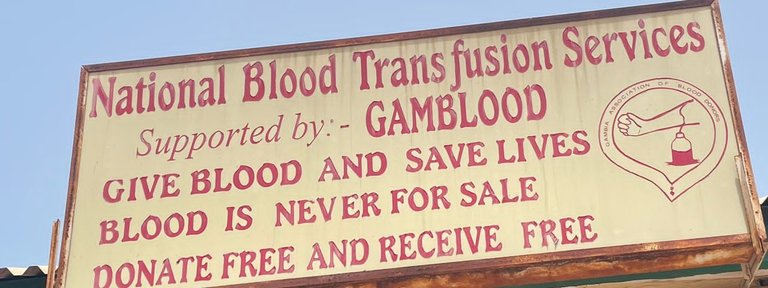Giving blood is a privilege. Receiving blood is a right
Hello lovelies.
Today, I want to talk to you about blood donation. Blood donation is the act of giving blood to save lives.

My journey of donating blood began 8 years ago. I had seen a WhatsApp status update that said "Woman, blood group A+ is in urgent need of blood. Please help!". I remembered checking my blood group back in high school, and it was A+. I have always been keen and eager for that day I would get the opportunity to donate. I replied to the status update saying "I'm A+". The one who had written the status immediately replied me saying "I will send your number to the family, and they would be intouch soon". Less than 15 minsutes later, I was contacted by the brother of the patient who needed the blood. He drove all the way to my junction to pick me up. I was excited. I heard a lot of things about blood donation. So having the opportunity to donate was a cool thing.

Initially, I was counseled on blood donation. The laboratory technician asked my age and whether I had eaten that day. He told me of the preliminary tests that they usually conduct before beginning the process. These tests included HIV, Hepatitis B and C, Venereal Disease Resource Laboratory (VDRL) for Syphilis. As a medical student, I understood those, and I was screened for them. Afterwards, I successfully donated, received some refreshments, relaxed in the lobby for over 30 minutes, and went home afterwards. The one who I had donated was patient who was suffering from Breast Cancer. However, her condition was not in the best of forms, and she passed away days later. I still remember her name. And I felt that feeling of being able to help someone in need.
2 years later, there was a blood donation drive organized by the Islamic Solidarity Association (ISA), and I didn't shy away from the opportunity to donate again. It was fulfilling. 3 years ago, I donated to a patient at one major referral hospital, Kanifing General Hospital. It felt like any other day for me.
Two weeks ago, I donated blood as part of the community project which after the Young African Leadership Initiative Regional Leadership Center (YALI RLC) training I had in late November - early December last year.

So why should one donate blood?
So blood donation is important for a lot reasons. The obvious importance for the receiving the blood is that it saves their live. With the donor, it's a lot more benefits for them.
A. Screening
Blood donation enables one to be screen for diseases one might be aware of. Most common diseases checked include hepatitis, syphilis, ans HIV. In advanced settings, Cytomegalovirus and other disease are checked too. You don't want to give a diseased pint of blood to your patient.
B. Reduce Iron Stores
Iron is one component of the blood you don't to be overloaded. Iron in the body is stored as Ferritin. The normal levels of stored iron for men is 24 to 336 ng/mL and 24 to 307 ng/mL for women. Women especially those in reproductive ages lose iron through bleeding on monthly basis when they menstruate. Men however, do not necessarily lose Iron as per our our body physiology. So iron build up in our cells causes a condition referred to as hemachromatosis.
Iron metabolism in the body is tightly controlled. The means by which iron is excreted from the body have not yet been established. Iron excretion is currently attributed to multiple processes including exfoliation of dead skin, blood loss, and turnover of intestinal epithelium.
Excess Iron is stored in body tissues such as liver, and pancreas where it can become tocix to those organs. In the pancreas, it can predispose one to having diabetes due to damage of insulin producing cells. It can cause Liver failure too.
C. Prevention of stroke
An indication to donate blood is when your Hemoglobin concentration is higher than normal. Blood is made up of different elements as I have previously noted. It has elements that allows for it to form clots when one gets injured. Blood vessels also get injured, and blood forms clots to cover those injuries. Clots in blood vessels have a tendency of dislodging and blocking blood supply to smaller blood vessels and cause a Stroke.
Blood moves through blood vessels with a resistance. This resistance is dictated by how thick (viscous) the blood is. Low viscosity means the blood is moving fast, and high viscosity means the blood is moving slowly. Several factors that can affect the viscosity of blood include hematocrit, plasma viscosity and presence of clotting factors. Hematocrit is 3x the Hemoglobin concentration (Hb). Normal Hb values are 11.5 - 15.5 and 13.5 - 17.5 for adult females and males respectively. With high Hb, it directly means hematocrit is trippled, consequently increasing the tendency of one's blood to clot.
What this means is that the higher your Hb, the more likely you are to get a Stroke. So donate blood if you don't want to have stroke.
D. Blood pressure control
When you donate blood, you give away 500 millilitres of blood. This reduction in blood volume reduces one's blood pressure significantly.
So there you have it! You can benefit a lot by helping others, and blood donation clearly shows that.
I hope this article inspires you to donate 🩸
Cheers 🥂
All Images belong to me
